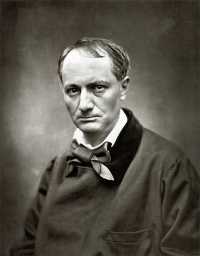Critic
From The Art and Popular Culture Encyclopedia
| Revision as of 19:52, 6 November 2013 Jahsonic (Talk | contribs) ← Previous diff |
Current revision Jahsonic (Talk | contribs) |
||
| Line 1: | Line 1: | ||
| - | [[Image:Charles Baudelaire.jpg|thumb|right|200px|"[[What is the good of criticism?]]" -- [[Charles Baudelaire]] | + | {| class="toccolours" style="float: left; margin-left: 1em; margin-right: 2em; font-size: 85%; background:#c6dbf7; color:black; width:30em; max-width: 40%;" cellspacing="5" |
| + | | style="text-align: left;" | | ||
| + | "What is the [[good]] of [[critic]]ism? What is the good? -- A vast and terrible [[question mark]] which seizes the [[critic]] by the [[throat]] from the very first step in the first chapter he sets down to [[write]]. ...I sincerely believe that the best criticism is that which is both [[amusing]] and [[poetic]]: not a [[cold]], mathematical criticism which, on the [[pretext]] of explaining everything, has neither [[love]] nor [[hate]], and voluntarily strips itself of every shred of [[temperament]]... To be just, that is to say, to justify its existence, criticism should be [[partial]], [[passionate]] and [[political]], that is to say , written from an exclusive point of view, but a [[point of view]] that opens up the widest [[horizon]]s." --[[Salon de 1846 (Baudelaire)|Charles Baudelaire writing on the occasion of the Salon of 1846]], first published as a booklet, Paris 1846, (tr. [[Jonathan Mayne]]) | ||
| + | <hr> | ||
| + | "I never read a book I must [[Critical acclaim|review]], it [[prejudice]]s you so." --[[Oscar Wilde]] | ||
| + | <hr> | ||
| + | "It is [[James Huneker|Huneker]], more than any other [[critic]], who has made Americans aware of ..."--''[[An Age Of Criticism 1900 1950]]'' (1952) by Van Oconnor William | ||
| + | |} | ||
| + | [[Image:Charles Baudelaire.jpg|thumb|right|200px|" | ||
| + | [[What is the good of criticism?]]" -- [[Charles Baudelaire]] | ||
| <br> | <br> | ||
| <small>Photo: [[Charles Baudelaire by Étienne Carjat]]</small>]] | <small>Photo: [[Charles Baudelaire by Étienne Carjat]]</small>]] | ||
| + | {{Template}} | ||
| [[Image:The Experts, 1837 by Alexandre-Gabriel Decamps.jpg |thumb|200px|''[[The Experts]]'' ([[1837]]) by [[Alexandre-Gabriel Decamps]]]] | [[Image:The Experts, 1837 by Alexandre-Gabriel Decamps.jpg |thumb|200px|''[[The Experts]]'' ([[1837]]) by [[Alexandre-Gabriel Decamps]]]] | ||
| [[Image:Nocturne in Black and Gold, the Falling Rocket, ca. 1875.jpg|thumb|right|200px|Art critic [[John Ruskin]] said about this painting by [[James McNeill Whistler]]: "I have seen, and heard, much of Cockney impudence before now; but never expected to hear a [[coxcomb]] ask two hundred [[Guinea (British coin)|guineas]] for flinging a pot of paint in the public's face." Whistler subsequently sued Ruskin.]] | [[Image:Nocturne in Black and Gold, the Falling Rocket, ca. 1875.jpg|thumb|right|200px|Art critic [[John Ruskin]] said about this painting by [[James McNeill Whistler]]: "I have seen, and heard, much of Cockney impudence before now; but never expected to hear a [[coxcomb]] ask two hundred [[Guinea (British coin)|guineas]] for flinging a pot of paint in the public's face." Whistler subsequently sued Ruskin.]] | ||
| - | {{Template}} | ||
| - | The word '''critic''' comes from the [[Greek language|Greek]] ''κριτικός, kritikós - one who discerns'', which itself arises from the [[Ancient Greek]] word ''κριτής, krités'', meaning a person who offers reasoned [[judge|judgement]] or analysis, [[value judgement]], [[interpretation]], or observation. The term can be used to describe an adherent of a position disagreeing with or [[opposing]] the object of criticism. | + | The word '''critic''' comes from the [[Greek language|Greek]] ''κριτικός, kritikós - one who [[discern]]s'', which itself arises from the [[Ancient Greek]] word ''[[κριτής]], krités'', meaning a person who offers reasoned [[judge|judgement]] or analysis, [[value judgement]], [[interpretation]], or observation. The term can be used to describe an adherent of a position disagreeing with or [[opposing]] the object of criticism. |
| Modern critics include professionals or amateurs who regularly judge or interpret [[performance]]s or other works (such as that of [[artist]]s, [[musician]]s or [[actor]]s) and, typically, [[publish]] their observations, often in [[periodical]]s. Critics are numerous in certain fields, including [[art critic]]s, [[music critic]]s, [[film critic]]s, [[theatre]] or [[drama]], and [[cultural critic]]s. | Modern critics include professionals or amateurs who regularly judge or interpret [[performance]]s or other works (such as that of [[artist]]s, [[musician]]s or [[actor]]s) and, typically, [[publish]] their observations, often in [[periodical]]s. Critics are numerous in certain fields, including [[art critic]]s, [[music critic]]s, [[film critic]]s, [[theatre]] or [[drama]], and [[cultural critic]]s. | ||
| + | ==Critical acclaim== | ||
| + | '''Critical acclaim''' means [[acclaim]] by [[critics]], in the form of exceptionally good reviews. | ||
| + | |||
| + | Critical acclaim and [[mass popularity]] seem to be [[mutually exclusive]]. In some rare instances they combine well. Examples of this are the [[double coding|double-coded]] films ''[[Borat]]'' (2006) and ''[[V for Vendetta (film)|V for Vendetta]]'' (2006) and the 2013 film ''[[La grande bellezza]]. | ||
| + | |||
| + | Critical acclaim is a [[weasel word]] for not having to mention the [[critic]]s who acclaimed. | ||
| + | |||
| - | == Appreciative criticism == | ||
| - | [[André Bazin]] is known as a proponent of [[appreciative criticism]], wherein only critics who like a film can write a review of it, thus encouraging constructive criticism. | + | ==Review== |
| - | == By field== | + | A '''review''' is an evaluation of a cultural product, such as a [[film|movie]], [[CD]], [[book]] or other [[cultural artifact]]. In addition to a [[critical]] statement, the review's author may assign the work a rating (for instance, one to five [[star (classification)|stars]]) to indicate its relative [[merit]]. |
| - | [[art criticism]] - [[critical theory]] - [[cultural criticism]] - [[film criticism]] - [[literary criticism]] - [[music criticism]] | + | ===Compare=== |
| + | *Fan-based ratings such as [[IMDb]] vs. [[review aggregator]]s such as [[Metacritic]] and [[Rotten Tomatoes]]. | ||
| + | ===See also=== | ||
| + | * [[Book review]] | ||
| + | * [[Film criticism]] | ||
| + | * [[Music critic|Concert review]] | ||
| + | * [[Music criticism]] | ||
| + | * [[Music journalism]] | ||
| + | * [[Review site]] | ||
| ==See also== | ==See also== | ||
| *[[List of criticism and critique articles]] | *[[List of criticism and critique articles]] | ||
| + | *[[Appreciative criticism]] | ||
| *[[Art criticism]] | *[[Art criticism]] | ||
| *[[Complaint]] | *[[Complaint]] | ||
| Line 28: | Line 52: | ||
| *[[Critical thinking]] | *[[Critical thinking]] | ||
| *[[Critique]] | *[[Critique]] | ||
| + | *[[Cultural elite]] | ||
| + | *[[Cultural criticism]] | ||
| *[[Film criticism]] | *[[Film criticism]] | ||
| *[[Literary criticism]] | *[[Literary criticism]] | ||
| + | *[[Literati]] | ||
| *[[Music journalism]] | *[[Music journalism]] | ||
| - | *[[Protest]] | + | *[[Praise]] |
| + | *[[Recognition]] | ||
| + | *[[Posthumous recognition]]'' | ||
| *[[Social criticism]] | *[[Social criticism]] | ||
| *[[Tastemaker]] | *[[Tastemaker]] | ||
Current revision
|
"What is the good of criticism? What is the good? -- A vast and terrible question mark which seizes the critic by the throat from the very first step in the first chapter he sets down to write. ...I sincerely believe that the best criticism is that which is both amusing and poetic: not a cold, mathematical criticism which, on the pretext of explaining everything, has neither love nor hate, and voluntarily strips itself of every shred of temperament... To be just, that is to say, to justify its existence, criticism should be partial, passionate and political, that is to say , written from an exclusive point of view, but a point of view that opens up the widest horizons." --Charles Baudelaire writing on the occasion of the Salon of 1846, first published as a booklet, Paris 1846, (tr. Jonathan Mayne) "I never read a book I must review, it prejudices you so." --Oscar Wilde "It is Huneker, more than any other critic, who has made Americans aware of ..."--An Age Of Criticism 1900 1950 (1952) by Van Oconnor William |
|
Related e |
|
Featured: |

The word critic comes from the Greek κριτικός, kritikós - one who discerns, which itself arises from the Ancient Greek word κριτής, krités, meaning a person who offers reasoned judgement or analysis, value judgement, interpretation, or observation. The term can be used to describe an adherent of a position disagreeing with or opposing the object of criticism.
Modern critics include professionals or amateurs who regularly judge or interpret performances or other works (such as that of artists, musicians or actors) and, typically, publish their observations, often in periodicals. Critics are numerous in certain fields, including art critics, music critics, film critics, theatre or drama, and cultural critics.
Contents |
Critical acclaim
Critical acclaim means acclaim by critics, in the form of exceptionally good reviews.
Critical acclaim and mass popularity seem to be mutually exclusive. In some rare instances they combine well. Examples of this are the double-coded films Borat (2006) and V for Vendetta (2006) and the 2013 film La grande bellezza.
Critical acclaim is a weasel word for not having to mention the critics who acclaimed.
Review
A review is an evaluation of a cultural product, such as a movie, CD, book or other cultural artifact. In addition to a critical statement, the review's author may assign the work a rating (for instance, one to five stars) to indicate its relative merit.
Compare
- Fan-based ratings such as IMDb vs. review aggregators such as Metacritic and Rotten Tomatoes.
See also
See also
- List of criticism and critique articles
- Appreciative criticism
- Art criticism
- Complaint
- Connoisseur
- Controversy
- Criticism
- Critical philosophy
- Critical theory
- Critical thinking
- Critique
- Cultural elite
- Cultural criticism
- Film criticism
- Literary criticism
- Literati
- Music journalism
- Praise
- Recognition
- Posthumous recognition
- Social criticism
- Tastemaker
- Textual criticism
- Theatre criticism



